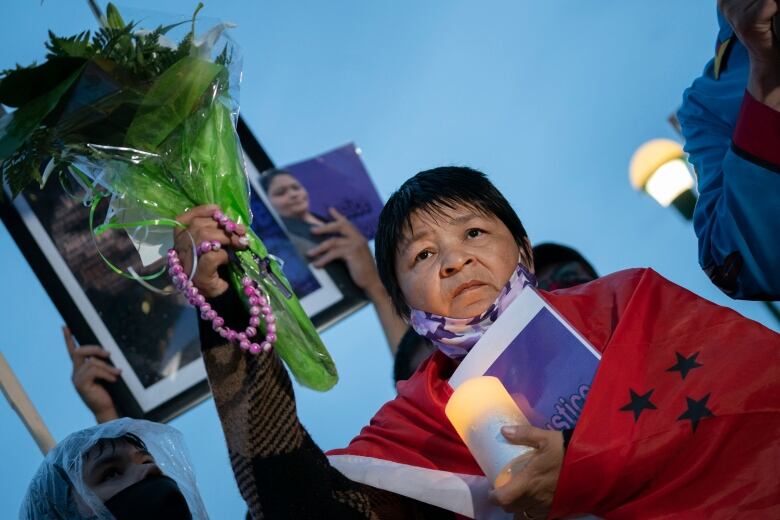Nurses fired after Atikamekw woman said they ‘humiliated’ her while she sought treatment
Two nurses at a health clinic in Joliette, Que., were fired Tuesday afternoon after an Atikamekw woman revealed they had taunted her with racist insults.
The incident occurred in the same regional health network where, six months ago, another Atikamekw woman — Joyce Echaquan — died not long after recording the racist treatment she received from hospital staff.
Jocelyne Ottawa, 62, said she was treated with disdain by two nurses at the clinic in Joliette, about 70 kilometres northeast of Montreal, which she visited last Friday to have a bandage changed on her foot.
“One of them told me, when she saw my name in the folder: “We’re going to call you Joyce, for short,’ Ottawa recalled in an interview with Radio-Canada.
“Then they asked me if I could sing them a song in Atikamekw.”
Ottawa also said that one of the nurses took her cellphone and that, when Ottawa realized it was missing, the nurse said: “I have it in my hand.” Ottawa told her: “You have no business looking at my cellphone.”
Firings meant to send message, health authority says
Ottawa said she felt humiliated and intimidated and, later, posted a message on Facebook about her experience.
“I told myself: ‘Why are they saying this to me? Is it to mock Joyce, once again?'”
The regional health authority, the CISSS de Lanaudière, which operates the clinic and the hospital, initially suspended the nurses without pay pending an investigation.
In a statement released late Tuesday afternoon, the health authority said the nurses had been fired.
“The comments made by the two employees showed a disregard for the code of ethics of the nursing profession and the code of ethics of our organization,” Caroline Barbir, the interim head of the CISSS de Lanaudière, said in the statement.
“The CISSS de Lanaudière has a zero-tolerance policy about behaviour that is racist, discriminatory and intimidating. I want that message to be heard loud and clear.”
Ottawa’s revelations renewed concern about the way Indigenous people are treated by health-care workers in Joliette and across Quebec.
Echaquan died in the hospital after she used her cellphone to film staff making derogatory comments about her. The video, which was posted live to Facebook, was shared around the world.
The previous head of the Lanaudière health authority was removed from his post last December in the wake of Echaquan’s death.
Quebec’s Indigenous Affairs Minister Ian Lafrenière said Tuesday it’s clear there is more work to do. But he maintained the government’s controversial position that systemic racism does not exist in the province.
Change will take time, he said, and training will need to be implemented across the province and even then, attending a course won’t solve everything.
“I’m so sorry. I’m so shocked. I’m so disappointed … Can we guarantee that it won’t happen again? The answer is no.”

The two nurses who were fired were among more than 4,200 CISSS employees who attended a cultural safety awareness session, an approach put in place in November. Further training is planned for health-care professionals across the province.
Nancy Bédard, president of the province’s largest nurses union, the FIQ, said her organization is committed to the fight against violence and racism, whether based on gender, race or cultural background.
“We strongly denounce any gesture and any behaviour conveying intolerance or racism. “
The case for Joyce’s Principle
For Sipi Flamand, deputy chief for the Atikamekw Council of Manawan, the latest incident is further proof the province must adopt what is called Joyce’s Principle, which aims to guarantee that Indigenous people have equitable access to health and social services without discrimination.
“As long as Joyce’s Principle is not adopted, there will still always be systemic racism and the Quebec government has the obligation to recognize it,” Flamand said.
Ottawa said she returned to the clinic on Monday, despite being unsettled by her earlier experience.
“I have no choice. I need care,” she said.
“I’d like to tell them that we, Indigenous people, are human beings in our own right. And we have a right to get the same care as any other individual no matter their race.”




